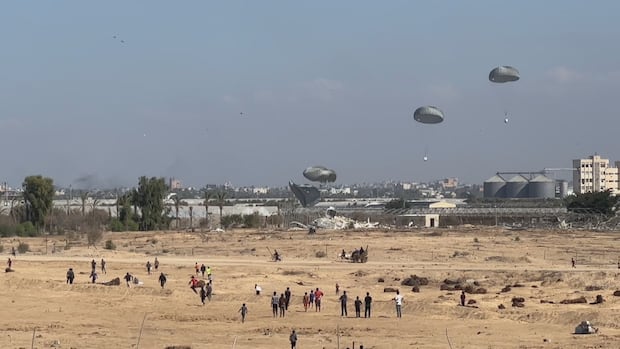Israeli military strikes across the Gaza Strip killed 20 Palestinians on Monday, including six people who were killed in attacks on tents housing displaced families, medics said.
Four people, two of them children, were killed in an airstrike on a tent encampment in the coastal area of Al-Mawasi, designated as a humanitarian zone, while two were killed in temporary shelters in the southern city of Rafah and another in drone fire, health officials said.
In Beit Lahiya town in northern Gaza, medics said an Israeli missile struck a house, killing at least two people and wounding several others. On Sunday, medics and residents said dozens of people were killed or wounded in an Israeli airstrike on a multi-floor residential building in the town.
The Israeli military, which has been fighting the Palestinian militant group Hamas in Gaza since October 2023, said it conducted strikes on “terrorist targets,” in Beit Lahiya.
An Israeli airstrike on a house in Gaza City killed seven people and wounded 10 others, medics said. Later on Monday, an Israeli airstrike killed four people in the Nuseirat camp in the central Gaza Strip, they said.
There has been no Israeli comment on Monday’s incidents.
The Gaza Health Ministry said Israeli military strikes had killed 76 Palestinians across the enclave in the past 24 hours.
In Nasser Hospital in Khan Younis, relatives of Palestinians killed in an Israeli airstrike on tents housing displaced families sat beside bodies wrapped in blankets and white shrouds to pay farewell before walking them to graves.
Child malnutrition cases growing, says hospital director
“My brother wasn’t the only one; many others have been martyred in this brutal way — children torn to pieces, civilians shredded. They weren’t carrying weapons or even know ‘the resistance,’ yet they were ripped apart into fragments,” said Mohammed Aboul Hassan, who lost his brother in the attack.
“We remain steadfast, patient, and resilient, and by the will of God, we will never falter. We will stay steadfast and patient,” he told Reuters. The Israeli army sent tanks and soldiers into Beit Lahiya and the nearby towns of Beit Hanoun and Jabalia, the largest of the Gaza Strip’s eight historic refugee camps, early last month in what it said was a campaign to fight Hamas militants waging attacks and prevent them from regrouping.
Hussam Abu Safiya, the director of the Kamal Adwan Hospital in Beit Lahiya, said the hospital was under siege by Israeli forces and the World Health Organization had been unable to deliver supplies of food, medicine and surgical equipment.
Cases of malnutrition among children were increasing, he said, and the hospital was operating at a minimal level.
“We receive daily distress calls, but we are unable to assist them due to the lack of ambulances, and the situation is catastrophic,” he said. “Yesterday, I received a distress call from women and children trapped under the rubble, and due to my inability to help them, they are now among the martyrs [dead].”
Large Gaza food convoy violently looted
A convoy of 109 trucks was violently looted on Nov. 16 after entering Gaza, resulting in the loss of 98 trucks in what aid workers say is one of the worst such incidents of its kind in the more than 13-month-old war, an UNRWA aid official told Reuters on Monday.
The convoy carrying food provided by UN agencies UNRWA and the World Food Program (WFP) was instructed by Israel to depart at short notice via an unfamiliar route from the Kerem Shalom crossing, Louise Wateridge, UNRWA senior emergency officer told Reuters.
“This incident highlights the severity of access challenges of bringing aid into southern and central Gaza,” she said, adding that injuries occurred in the incident.
“The urgency of the crisis cannot be overstated; without immediate intervention, severe food shortages are set to worsen, further endangering the lives of over two million people who depend on humanitarian aid to survive,” she said.
The search for food in Gaza has grown more difficult as the Israel-Hamas war drags on, and as the potential for famine sets in, the rush toward aid packages dropped from planes can potentially be lethal. One man told a freelance videographer for CBC News that there are families sheltering in the fields where some drops happen, and if boxes land nearby, they are claimed and those families will shoot anyone who comes near them.
WFP and COGAT, the Israeli military agency that deals with Palestinian civilian affairs, did not immediately respond to a request for comment. The agency says it does all it can to ensure that enough aid enters the coastal enclave, and that Israel does not prevent the entry of humanitarian aid.
A UN aid official said on Friday that Gaza aid access had reached a low point, with deliveries to parts of the besieged north of the enclave all but impossible.
Israel invaded the Gaza Strip last year after the Hamas-led attacks in southern Israel on Oct. 7, 2023, which killed an estimated 1,200 people, according to Israeli authorities, and militants abducted more than 250 as hostages. An estimated 100 hostages remain in Gaza.
Israel has since killed more than 43,800 people, according to Gaza health authorities, and destroyed much of the enclave’s infrastructure, forcing most of the 2.3 million population to move several times. The Palestinian civil emergency service estimates that the bodies of 10,000 people may be trapped under the rubble, which would take the reported death toll to more than 50,000.


